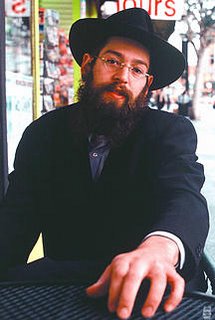Matisyahu Brings Kosher Vibration - Rolling Stone article
It's an occupational hazard for the twenty-six-year-old reggae up-and-comer, whose single "King Without a Crown" is an MTV hit -- and who also happens to be a Hasidic Jew. In accordance with Jewish law, the performer -- who began practicing Orthodox Judaism when he was twenty -- has had to stop stage-diving at shows so as to avoid the risk of physical contact with women who aren't in his family. By the Talmud's decree, he can't even shake hands with his female fans.
"It's hard to sign CDs and tell every other person that comes over to you some form of 'no,'" says Matisyahu. "And you don't have time to get into a discussion as to why you can't. It can come off as disrespectful."
Despite his restrictions, Matisyahu's Live at Stubb's, released in April, has become an unlikely hit -- climbing to Number Thirty-two on the album chart last week.
"With Matis, thirty seconds in, you're shocked," says VP of Sony A&R Michael Caplan, who signed Matisyahu to Epic. The label will release his Bill Laswell-produced studio album next month. "Ninety seconds in, you're like, 'Wow. This is really good.' He's not Snow."
Most of the recent hype is tied to "King Without a Crown," a Brooklyn-meets-Kingston jam with beatific lyrics that showcase Matisyahu's Luciano-like flow. "The song's got a Sublime-ish, Southern California vibe to it, which appeals to our listeners," says Lisa Worden, music director at L.A.'s tastemaking modern-rock station KROQ. "And lyrically, it's uplifting and positive."
Since the video went into rotation on MTV in January, sales of the album have averaged 20,000 per week. "Once Top Forty radio play took off, we really started moving units," says Carlos Adams, urban product manager for Virgin Megastores. "He's been the Number One reggae artist for twelve weeks."
Matisyahu has even got cred in the reggae community. "When I first heard him I was blown away," says D'Niscio Brooks, producer of New York's Carifest, where Matisyahu headlined alongside Buju Banton and Elephant Man last summer. "He sings truth and he sings it from his heart."
So what do his own people think? "One of the tenets of Hasidism is lowering oneself in order to raise oneself," says Rabbi Shlomo Einhorn of New York's West Side Institutional Synagogue. "If someone is accomplished artistically and can glorify God, it serves everybody."
Posted Feb 14, 2006
(thanks to Chaim)

0 Comments:
Post a Comment
<< Home